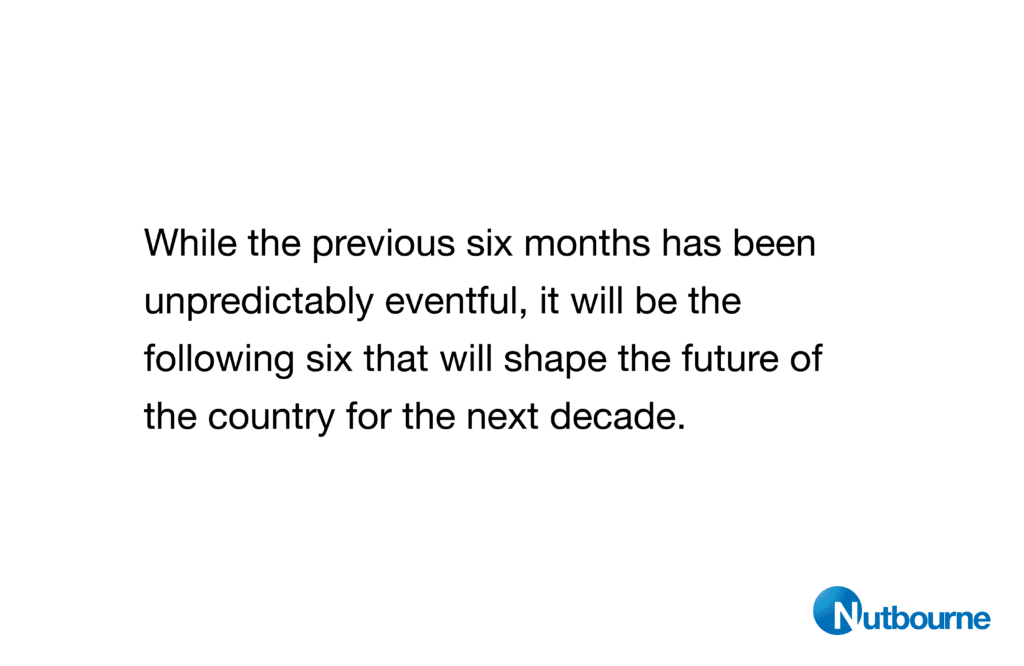In October 2019, the world was a very different place. Brexit was the topic du jour for the UK, the Sussexes were very much part of the Royal Family and Boris Johnson was gearing up for his first general election as Prime Minister. Six months on and Brexit seems largely irrelevant, while Harry and Meghan’s isolation is now one that is enforced rather than chosen. Johnson, meanwhile, has gone from the frying pan into the fire and back again as he seeks to lead the country through the crisis, following a stint in intensive care with COVID 19.
While the previous six months has been unpredictably eventful, it will be the following six that will shape the future of the country for the next decade. The impact of the coronavirus will be felt most keenly by the loss of life and loved ones, but it’s effect on our daily lives, civil liberties and business has the potential to be long-lasting too and to alter life as we know it.
MD Marcus Evans of Nutbourne, IT solutions in London, shares his thoughts on how world will look six months from now and how we can prepare for the future.

How will the Covid 19 outbreak change the business landscape?
When you reflect on how the economy could look in six months’ time, it looks very different to how it would look after 90 days. In that time there is the hope that the government will have got its response together and we are looking at returning to something resembling normal. We’ll likely see a surge in visits to bars and restaurants as people return to socialising.
In terms of other businesses, you will have a scenario where people have been working from home for a lengthy period. They will have shown that it’s possible to do their job remotely for two or three days a week, so will have increased leverage when it comes to flexible working. That actually opens the job market too. Typically for a company like Nutbourne that is London-based, we’d employ someone that lives at a maximum commutable duration of 90 minutes away. But with new ways of working trialed, tested and improved, we could conceivably look at employing someone from Manchester to work remotely for 5 days a week at Nutbourne IT solutions London. Having that flexibility in who we employ could be vital in the medium to long term.
There will inevitably be a recession – and some are saying a depression. What is your business focus with that on the horizon?
There is no getting away from the fact that a lot of companies will go bankrupt, far more than you would expect in a normal recession, if we enter a depression – that isn’t certain of course. The economic outlook right now is that the economy will inevitably shrink and to a far greater degree than in 2008. The Government will also have to repay the money it’s borrowed to prop up businesses through the lockdown period, and you would expect it to come under pressure to start putting more money into the NHS and for key workers in general – and they’ll need to somehow stimulate businesses to grow.
In that scenario, you’re going to see businesses start to entrench. The focus shifts from three months survival to six months survival. And at six months survival, they’ll be looking to two years, but they will have a completely different mindset. The Coronavirus isn’t going away any time soon, so the likelihood of another lockdown is high. Businesses will prepare for that and should prepare for it as soon as is practically possible. They’ll know what worked for them and what didn’t this time round. I think until there is a vaccine and/or clarity over what immunity looks like, there will be social distancing measures in place – at least for the very vulnerable. You’re going to have to look at your staff very differently because of that. Commuting into London or any other big, densely populated city is an issue when the coronavirus is still around.

How do you plan for that?
The coronavirus is now endemic in most populations, it’s not going anywhere until there is a vaccine to stop it. Because of that, you will see a lot of macro changes – global travel drops off, holidays are less likely, the demand for oil reduces and consequently climate change metrics start to improve for the better. It’s the view of our IT solutions London company, that to prepare your business against that kind of backdrop you will need to focus on three things. Think of the people you work with, the people you work for and how to remain profitable. If the first one is in place then the other two naturally follow – and it shouldn’t be a problem if you have recruited a good team.
The environment over the next months will see the job market tighten. In a recession, people don’t leave secure jobs because it’s too much of a risk. So, retention should be high and where those retained staff have been well looked after, they’re more likely to value their job and have an affinity for the company and its clients. You will inevitably get people that want out but can’t move and that can create a toxic atmosphere. So, building a rapport, supporting those staff with more favourable working conditions – such as working remotely – will help, even in the short term, even if it’s just to bridge a gap.
The same applies to clients and suppliers too, doesn’t it?
Yes, absolutely. In a recession, replacing staff and replacing clients is arguably the hardest thing to do.
Look after your clients, look after your suppliers, look after the people who work with you and alongside you to try and make your business viable. What does that mean? It means when clients are having troubles with money, try and help them out as much as possible. Build loyalty the right way, and understand they have the same issues as you. Always ask how you can work around their issues, and how can you make difficult situations work.
What positives are there to take from the current scenario?
We’re going to see a sense of community like you’ve never seen here before, and that is reassuring. It’s a shame that it’s taken this to make that happen, but it’s also very nice that it is possible for that to happen in these circumstances. People will pull together and people will try to help.
I think we’ll see far more understanding for the positions people are in, certainly in the short term. We’ll look at what people take on in a different light. Most business owners will know this – you look at your team and ask if they’re ok, if they’re alright, is there anything I can do for them? Within that you also have to recognise if you as a business owner are ok, whether you’re doing good job and coping with the responsibility. I think the fraternity of SME owners in the UK will become closer and stronger, and support each other even more than they have done in the past – because at the end of the day, you’re in business to help people. At Nutbourne, we offer IT solutions in London, yes, but more than that, we look to offer help.
If you’d like to find out more about Nutbourne, then get in touch! Contact our IT solutions London office today on 0203 137 7273.
